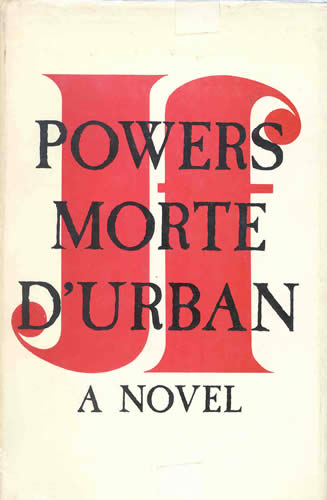Hello, OGIC here. I’ve been away from the blog for two years, so to get my feet wet again, here’s just a frivolous post about my current reading.
Two-thirds of the way through J. F. Powers’s novel Morte D’Urban, I’m wondering where this book has been all my life. Father Urban, the ambitious Clementine priest at its center, surprised me from the beginning. He treats his vocation, Terry wrote in the New Criterion years ago, “precisely as he would any other job: with one eye firmly fixed on the main chance.” He doesn’t suffer his less worldly, less canny colleagues gladly, and Powers does a wonderful job of satirizing both his main character and those around him as they appear through Father Urban’s ever appraising eyes.
 I’ve been laughing helplessly through the book, but have also read far enough in Terry’s essay to know that this comedy is headed somewhere serious. Not having reached that point yet, I want to pull out for your amusement something very small and inconsequential in the book, and very charming: dogs.
I’ve been laughing helplessly through the book, but have also read far enough in Terry’s essay to know that this comedy is headed somewhere serious. Not having reached that point yet, I want to pull out for your amusement something very small and inconsequential in the book, and very charming: dogs.
In what seems to me a purely playful impulse–though for such a meticulous writer, I wonder whether something more is going on–Powers outright anthropomorphizes the three dogs I’ve encountered so far in Morte D’Urban. In a few quick strokes, he makes them seem to observe the human folly playing out in front of them with bemusement, as you might imagine some of the dogs drawn by James Thurber or George Booth doing. Here, they even (sort of) speak. In some passages you get the sense they are secretly running the show. I find them among the most memorable people in the book.
The first dog to appear remains unnamed. It resides in the station at Duesterhaus, the Minnesota outpost to which Father Urban has been banished from the place he deems his proper setting, Chicago. On arrival, Father Urban instantly gets a taste of his new isolation:
The station agent, writing at his desk, seemed unaware of [Father Urban]. An old dog lying behind the counter woke up and gave him a look that said, Can’t you see he’s working on his report?
“I’d like to call a taxi, if I may,” said Father Urban, giving the town the benefit of a doubt, and then he waited.
Presently the agent got up and came to the counter. He pushed the telephone at Father Urban and tossed him a thin directory. “Cost you a dime to call,” he said.
The dog opened its eyes, as if it wanted to see how Father Urban would take the bad news.
Father Urban put a dime on the counter.
The dog closed its eyes.
 The next dog, Rex, belongs to a local man who sells the land for a golf course to the Clementine order, a deal put together by Father Urban with the backing of Billy Cosgrove, a patron from Chicago. On his first visit, “Father Urban found Mr. Hanson and the dog at home,” Powers writes. “The dog seemed to recognize him, but Mr. Hanson didn’t, and so Father Urban introduced himself.”
The next dog, Rex, belongs to a local man who sells the land for a golf course to the Clementine order, a deal put together by Father Urban with the backing of Billy Cosgrove, a patron from Chicago. On his first visit, “Father Urban found Mr. Hanson and the dog at home,” Powers writes. “The dog seemed to recognize him, but Mr. Hanson didn’t, and so Father Urban introduced himself.”
The black dog largely takes over the situation when Father Urban arrives with several associates on his next visit.
Mr. Hanson and the truck were elsewhere, but Rex showed the party around the farm. Most of the time they walked in silence, Mr. Robertson occasionally raising small binoculars to his eyes. When they were back where they’d started from a half hour before, Billy said:
“Well?”
Mr. Robertson gave the frozen ground, which he’d been eying from all angles, from close up and afar, one last kick, and said:
“I don’t see why not.”
“Let’s make it a standout course,” said Billy.
As they were getting into the cars, Monsignor Renton now alone in his, Rex spoke to them, and a moment later Mr. Hanson and the truck appeared.
Billy, who had been told about Father Urban’s accident, said to Mr. Hanson: “Paid that bill yet–that collision bill?”
“Yar, I got to pay it,” said Mr. Hanson.
“Yar,” said Rex to Monsignor Renton.
It’s worth noting that the buyers eventually negotiate for Hanson to throw in the dog with the land, in a conversation Rex follows closely. Later an “aged Airedale” named Frank turns up, the color of “dark chocolate that had melted and hardened and lightened,” but I’ll let you discover him yourself if you happen to pick up the book–which you really, really should. In the meantime, I’ll try to find out whether Powers was a dog owner, and what his dogs thought about it all.
